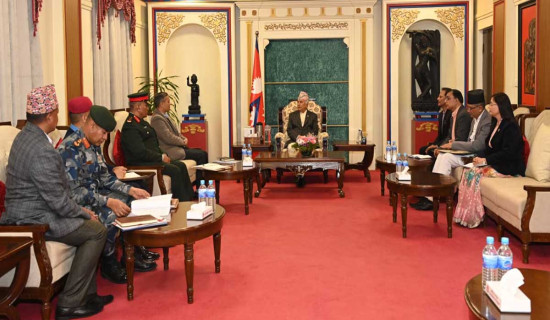- Saturday, 14 February 2026
TRC: Holding Balance Is The Way Out
The government has tabled the revised bills relating to truth and reconciliation commission, among others, to fast-track the long procrastinated process of transitional justice in the country Going by the contents of the preliminary debates in the parliament, it appears that the revised bill has not been able to muster much support and bridge the divide across the broader social and political spectrum in the country. This may further intensify the divisions and put brakes on the entire process if the consultative dialogues across the divisions are not held to bridge the gaps. In fact, the notion of Truth and Reconciliation Commission (TRC) was conceived in 2006 in Nepal following the signing of Comprehensive Peace Accord between the state and Maoist rebels.
CA endorsement
The notion was attempted to translate into a reality in 2013 when the law for the same was endorsed by the then Constituent Assembly that was also mandated to act as the national legislature apart from carrying out the responsibility of authoring the new democratic federal constitution. Accordingly, new act that had envisaged the roles and mandates of the TRC was passed. The statute was heavily scrutinised considering the major flaws associated with possibility of amnesty for those alleged of having committed the heinous crimes amounting to gross violation of human rights. Eventually, the Supreme Court (SC) had struck down the certain provisions of the law and gave its verdict that the impugned statutory arrangements be reformed to comply with international human rights standards.
Though the government constituted and reconstituted the commission at least twice in the past, both of the commissions formed have yet failed to take the imperatives of transitional justice to their logical end. The first commission was headed by Surya Kiran Gurung but it was not able to make important headways in resolving the issues due to legal, logistical and several other attendant constraints. Later, the commission was reconstituted after a long hiatus and it was led by senior lawyer Ganesh Dutta Bhatta but it also could not provide a much-needed momentum to the reconciliation process. The real crux why the commission has failed to lend momentum to the transitional justice process lies, besides the logistical and resource related problems, in the mutually conflicting positions of the stakeholders in the interpretation of statutory provisions.
This has resulted into a manifest opposition and resistance of the conflict victims and human rights groups alleging that the statutory provisions do not meet the minimum legal standards. The latest attempt to reform the act has also meted out with opposition alleging that the new provision is not in line with the standards of the criminal justice. This is also reflected in the initial reactions of some of the lawmakers when it was tabled for deliberation in the parliament the other day. The transition justice process has received the unexpected twist recently when the Supreme Court overturned its previous order to shelf the petition and gave leave to file newly-framed case against the Maoist leaders, including the incumbent prime minister Pushpa Kamal Dahal Prachanda.
In fact, the concept ‘transitional justice’ subscribes to the values of restorative justice in sharp contrast to retributive and vengeful approach of punishing the criminals and wrongdoers. Nepal’s Truth and Reconciliation Act draws partly from South African experimentation that was based on the principle of restorative justice, participation and reparation. The TRC in South Africa was born of a spirit of public participation, as the new government headed by Nelson Mandela solicited the opinions of South Africans and the international community regarding the issue of amnesty as well as the issue of accountability in respect to past violations of human rights and reparations for victims. This consultative process culminated in the formulation of the Act.
Accordingly, TRC was formed and tasked with investigating human rights abuses committed from 1960 to 1994, including the circumstances, factors, and context of such violations, allowing victims and perpetrators the opportunity to tell their story. The commission dwelt around granting amnesty; constructing an impartial historical record of the past; and drafting a reparations policy. Nonetheless, the S. African TRC was confronted by a number of challenges, as it was not accepted like in Nepal by all parties to the conflict. According to the reports, the top echelons of the military did not cooperate with the commission.
S. African experiment
Senior politicians in the former government and senior leaders in the security forces did not show their willingness to cooperate with the commission. In the case of the leaders of liberation participating in movements against the apartheid regime, they argued that as they had conducted a “just war,” and their actions did not constitute gross violations of human rights. Nevertheless, the hearings of the TRC attracted global attention, as it was the first commission to hold public hearings in which both victims and perpetrators were heard. At the same time, it laid the foundation for building reconciliation among all South Africans.
Like in South Africa, Nepal should set an example for the world ensuring that impunity was not tolerated and those charged of gross violations of human rights including killing of the innocent citizens, rape and torture were booked to justice. The perpetrators should definitely be held responsible for their criminal acts and wrongdoings. However, as in South Africa, the utmost care needs to be taken to ensure that the retributive approach to inflict punishment on the perpetrators need to be shunned for the sake of national unity and reconciliation. The retributive and punitive approach may trigger a new round of conflicts putting all the gains of democratic stability and peace at the abeyance.
(The author is presently associated with Policy Research Institute (PRI) as a senior research fellow. rijalmukti@gmail.com)
















-original-thumb.jpg)
